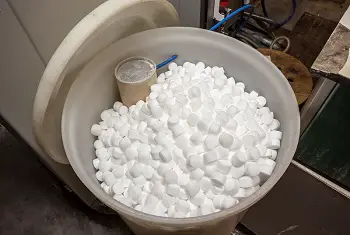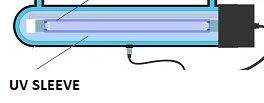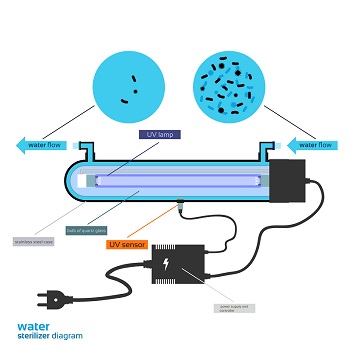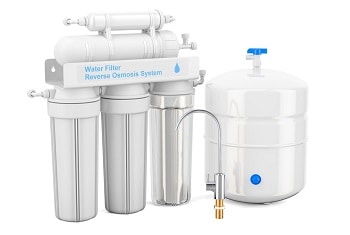You know that your water softener makes your water soft by removing hard minerals from your water and your water looks perfectly clear but is your water softener actually purifying your water?
A water softener does remove impurities from the water that make the water hard, but there are many impurities in water that a water softener will not remove. To purify water, it would need to have many impurities removed that are not removed by a water softener.
Having a water softener to improve your water by removing the hardness from your water is a great idea, but if you want to truly purify your water to make it safer and healthier to drink, you are going to need a little more than just a water softener.
In what way does a water softener purify water?
To purify water simply means to remove impurities from it. A water softener removes hard minerals and some metals like iron and manganese from your water, so a water softener is in some ways purifying your water.
Check this quick video on how a water softener removes minerals from your water.
Most people think of purifying your water as removing anything that is not considered to be healthy from it. A water softener is simply not designed or able to remove anything but hard minerals from your water.
In some circumstances where your water has no harmful organic materials in it and minimal dissolved solid in it, a water softener may be all that you need to purify your water of iron and hard minerals to the point where it is basically healthy.
In most cases though, a water softener is just the first step in getting your otherwise unhealthy water purified to where it could be qualified as being healthy to drink.
Some common impurities and how they can be removed from your water.
| Impurity | Water Softener | Sediment Filter | Carbon Filter | Reverse Osmosis | Distillation |
|---|---|---|---|---|---|
| Hard Minerals | YES | NO | NO | YES | YES |
| Iron | YES | YES | YES | YES | YES |
| Sodium | NO | NO | NO | YES | YES |
| Lead | NO | NO | YES | YES | YES |
| Bacteria | NO | NO | NO | YES | YES |
| Coliforms | NO | NO | NO | YES | YES |
| Chlorine | YES | NO | YES | YES | YES |
How can I find out if my water softener is removing the impurities that it should?
Since a water softener is used to removed hard minerals and sometimes iron from your water, all you need to do to make sure that it is doing this is to test your water with a simple water hardness test kit or an iron test kit.
The first thing that you may notice if your water softener is not removing hardness and iron from your water is that the salt in your water softener is not going down.

If a water softener is not using salt, then it is not regenerating the water softener resin which means that the resin cannot remove more hardness or iron from your water.
If this happens, your water softener will not be purifying your water in any way.
Is the water from my water softener pure enough to drink?
Without getting a detailed test of your water by a laboratory you can’t be sure if your water is pure enough for drinking. But in many cases, using a reverse osmosis system in addition to your water softener will reduce or completely remove any harmful impurities.
You could start by using a basic water test kit to give you a wide range of testing for many common impurities that could cause health issues or that are generally not good to have in your water.
The hard minerals and iron that a water softener removes from your water are not considered to be unhealthy, to begin with so the only significant negative change to your water after it has been softened by your water softener is that it may have extra sodium in it.
When a water softener regenerates, it uses the sodium ions provided by the salt from the water softener brine tank through a process called ion exchange to remove the hard minerals from the water softener resin.
After the water softener regenerates the water softener resin, it leaves behind sodium ions where the hard ions once were. Because of this, the sodium content of your water may be less pure than before it went through your water softener.
To purify the water coming from your water softener of this excess sodium along with many other impurities, you may want to consider using a reverse osmosis system which will not only reduce the dissolved solids like sodium in your water by up to 98%, but it will also help to reduce odors and odd tastes in your water.
Do some water softeners purify water better than others?
The resin inside of a water softener that actually removes hard minerals from your water is very much the same from one water softener to another.
So the ability of water softening to purify your water will be very much the same no matter which water softener system that you purchase.
But there are some water softeners that contain carbon in their tank as well as water softener resin.
By having carbon in a water softener, it will be able to remove chemicals like chlorine which can cause your water to taste bad or have an unpleasant odor.
Carbon is also able to reduce Fluoride levels in your water along with volatile organic compounds (VOCs) which can contribute to poor tasting water and odd odors from your water.
What else would be needed to purify my water?
If there is organic material in your water like bacteria, installing an ultraviolet water purifier and a reverse osmosis drinking water system should make your water taste better and also purify it to the point where it should be healthier to drink.
Because hard minerals and iron in your water can build-up on the sleeve that contains the UV lamp, a water softener should be the first step in purifying your water if it contains hard minerals or iron.

Once your water softener has removed the hard minerals from your water, an ultraviolet water purifier will be able to neutralize organic material from your water to purify it.
A reverse osmosis drinking water system will also purify your water by removing organic material and many other impurities by using a semi-permeable membrane to filter impurities out of your water.
When hard minerals or iron is present in your water, a water softener should be used to remove the hard minerals and iron before reverse osmosis is used to further purify your water.
In many cases, there will be no need for all kinds of filters or even ultraviolet light. The most common impurities that people want to be removed from their water are dissolved solids including sodium.
This is why reverse osmosis systems have become so popular, they are very inexpensive, easy to use and do an excellent job of purifying your drinking water.
If a water softener doesn’t purify my water, why do I need one?
Although a water softener does very little to purify your water to make it more beneficial for drinking, it does purify your water in a way that makes your water much more beneficial for your home and your appliances.
Calcium, manganese, iron and other hard minerals in your water can cause spotting, clogging, and corrosion of the water fixtures in your home.
A water softener will remove these impurities from your water, protecting your home from the damage that can be caused by hard minerals in your water.
Why do I need a water softener, when I purify my water using a reverse osmosis system?
A reverse osmosis system does a great job of purifying your water for drinking, but hard minerals in your water will cause the reverse osmosis membrane to clog and stop your system from producing purified water.
The water going into a reverse osmosis system should be soft and free of iron.
If there are hard minerals in the water that goes into your reverse osmosis system, the hard minerals will settle into the mesh of the reverse osmosis membrane and over time it will not allow the water to flow correctly through the membrane.
Iron in your water will also clog your reverse osmosis membrane and non dissolved iron can quickly clog your systems pre-filter which can mean poor quality water coming out of the system because the membrane needs good water pressure to purify your water correctly.
A properly working water softener will remove the hard minerals and iron from your water which will allow a reverse osmosis system to further purify the water, without a water softener purifying your water to some extent, a reverse osmosis system will not be able to purify your water as thoroughly as it should.
To Sum Up!
Purifying water simply means that you are removing unwanted impurities from it to improve the water quality.
Because a water softener does remove unwanted hard minerals and iron, it does to some degree purify your water, but not in the way that many people think.



